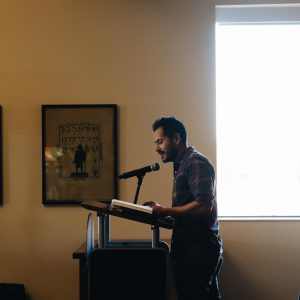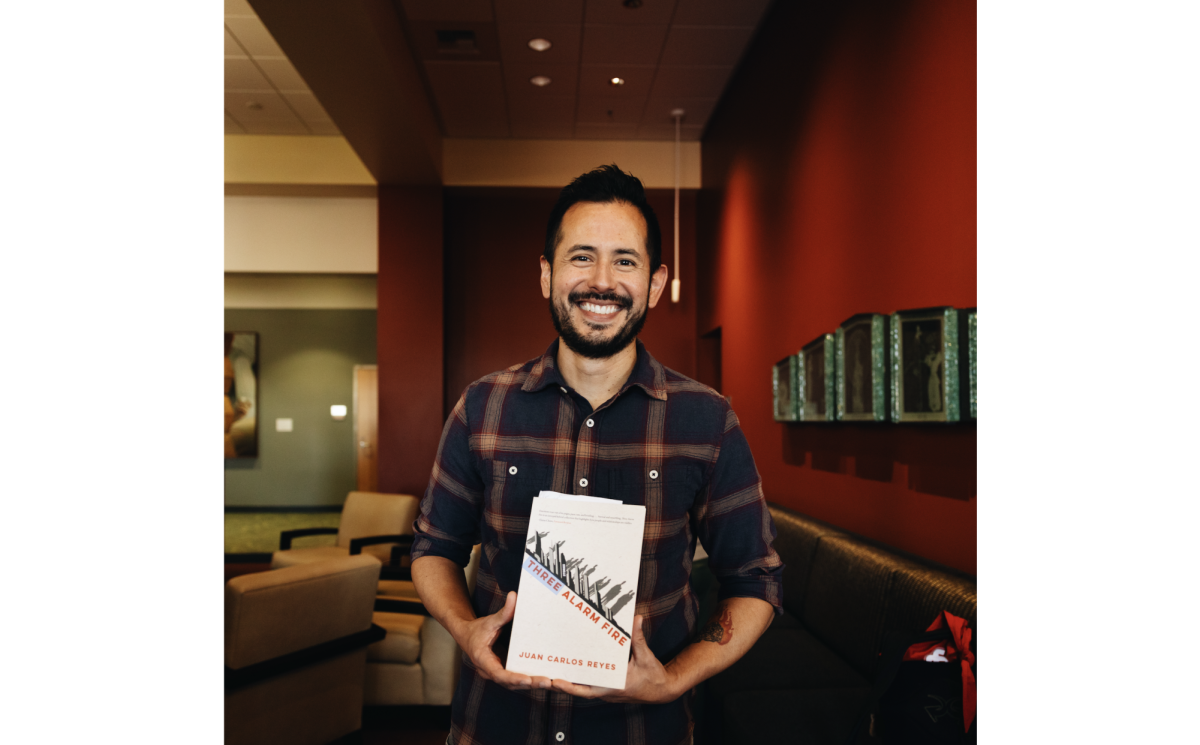In the small and cozy corner of the sixth floor of the library, faculty, students and friends alike sat in a cluster as Juan Carlos Reyes took to the podium. Each attendant sat holding a copy of “Three Alarm Fire,” Reyes’ newly published short story collection, and applauded as he kicked off the launch, a celebration of his publishing.
Reyes, associate professor of creative writing, spent the last 18 months working on the collection, which includes 15 short stories and a novella. Playing off the name of the collection, the stories with similar themes and subject matter are grouped into threes.
 During the event, Reyes introduced the collection and gave some background as to the intentions that went behind it. Named after the lowest category of major fire alarms, the title and shared themes of the collection allude to a major catastrophe, but one that we can hopefully come back from.
During the event, Reyes introduced the collection and gave some background as to the intentions that went behind it. Named after the lowest category of major fire alarms, the title and shared themes of the collection allude to a major catastrophe, but one that we can hopefully come back from.
In his speech and demeanor, there was a clear sense of pride and accomplishment. Surrounded by supporters at the school where all the stories were written, the event was more than a simple announcement: it was an opportunity to appreciate the hard work that went into the book and the people that were there for Reyes as he wrote it.
“It’s really cool to be on campus and have an intimate setting here that I know, that everybody here is so comfortable with, and to be able to sort of explore some of the ideas in this book, but also to share it,” Reyes said.
During the launch, Reyes also read one of the stories from the collection, “Everyone Lives Tomorrow,” a story about a migrant boy who was given powers through illegal government testing that explores themes of justice and mortality.
Ferin Jones, a first-year criminal justice major and a student of Reyes, spoke highly of his professor and the shared work.
“It was a very moving story… “It’s kind of interesting to get a kind of grittier version of the superhero tale that’s so related to identity and being an American,” Jones said.
Third-year Social Work Major Nicole Bautista was also motivated to come to the launch because of her positive experiences with the professor.
“What he says in class is really eye-opening and he’s a really good writer. I’m hoping that some of that will rub off on me,” Bautista said.
“Three Alarm Fire” is a work that sets out to create a portrait of tragedy, while simultaneously providing insight into grief, the healing process and the hope that has the potential to pull us through it.
The collection does this not only by presenting a variety of characters, perspectives and settings, but also through variance in the genre and style of each piece. While it has its fair share of difficult stories—dealing with topics like suicide, rape, and mass shootings—it also allows itself to discuss love, hope, and healing.
The second section, “Of Hearts & Minds,” does just that. Sitting between groupings of stories about greed, corruption, hopelessness, and tragedy, it offers three love stories to the reader. In the midst of contemplating our own destruction, these stories offer respite through tender examples of the good in life.
 Moments like it allow for the collection to curate variety and nuance, which are integral to the impact of the themes. Reyes strives to not hammer on one idea, but to use themes to connect the vast array of experiences and tribulations that make up what it means to be human.
Moments like it allow for the collection to curate variety and nuance, which are integral to the impact of the themes. Reyes strives to not hammer on one idea, but to use themes to connect the vast array of experiences and tribulations that make up what it means to be human.
Further, the variety within the collection serves as much a pragmatic purpose as it does a thematic one. As he is still early in his publishing career, Reyes spoke about how decisions made in this publication could help him later, like with the novel that he is currently working on.
“If this was going to be the first thing that came out, then I wanted to get a head start on that demonstration of emotional range… and then, pave the way for the stuff that comes next.”
Another thing that stands out about the collection is Reyes’ stylistic choices concerning dialogue and the formatting of the text. Within the stories, he chooses to only use commas to separate dialogue, forcing the reader to consider the dialogue in a different way than they are used to.
“You have to really sit with a character and their emotional situation. You’re not allowed to rush through it,” Reyes said.
Through techniques like this, Reyes creates characters that are extremely distinct in their voice and attributes, while also being relatable and symbolic.
Ultimately, Reyes bites off quite a lot with this collection, attempting to consider the extremes of human experience and much of what is in between. In doing so, he has created a set of impactful characters and situations that prompt the reader to think deeply about our shared experience of modern life.
“Three Alarm Fire” is available for purchase online.








